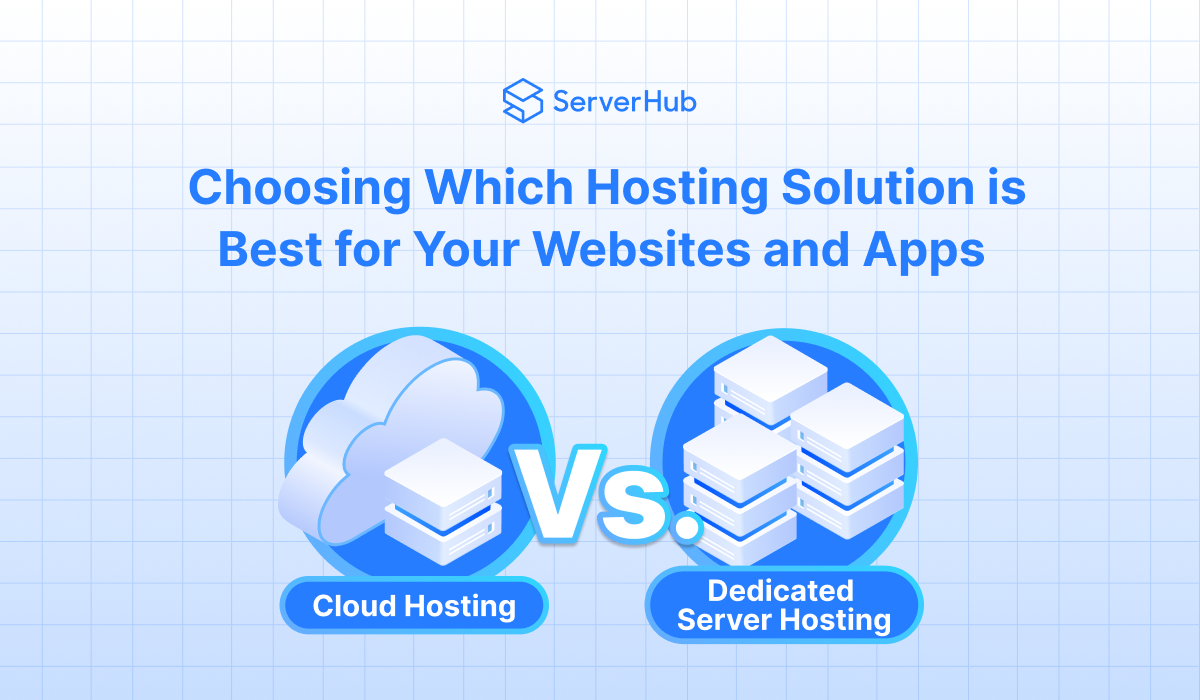In the world of web hosting, choosing the right hosting solution is critical for businesses of all sizes. Two of the most popular hosting options are cloud hosting and dedicated server hosting or dedicated hosting. Each solution has its own advantages and challenges, making it essential for you to understand the differences so you can make an informed decision.
In this article, we will discuss an overview of cloud hosting and dedicated hosting and the comparisons between these two hosting solutions. We will also discuss the factors to consider when choosing between cloud hosting and dedicated hosting as the hosting option for your websites and applications.
Overview of Cloud Hosting
Cloud hosting is divided into the following categories, each catering to different needs:
1. Managed cloud hosting: This type of hosting involves a service provider managing the cloud infrastructure for the user. It includes services such as regular backups, security updates, and performance monitoring, making it an ideal choice for businesses that prefer to focus on their core operations without worrying about server management.
2. Reseller cloud hosting: This allows individuals or businesses to purchase cloud hosting resources and resell them to customers. It is commonly used by web developers and agencies that want to provide hosting services without investing in their own infrastructure.
3. Private cloud hosting: This option provides dedicated resources for a single organization, ensuring enhanced security and control over the hosting environment. It is often preferred by businesses with strict compliance and security requirements.
4. Hybrid cloud hosting: This combines both public and private cloud solutions, allowing businesses to enjoy the benefits of both environments. It maintains sensitive data in a private setting while offering flexibility in scaling resources.
Overview of Dedicated Hosting
Dedicated server hosting is a traditional hosting solution where an entire physical server is allocated to a single client. This option provides complete control over the server's resources, including hardware, operating system and software configuration.
Categories of Dedicated Hosting
- Managed dedicated server hosting: This service includes complete management of the dedicated server by the hosting provider. It typically involves regular updates, security monitoring and technical support, making it suitable for businesses without in-house IT expertise.
- Unmanaged dedicated hosting: In this model, the client is responsible for managing the server, including software installations, security configurations and troubleshooting. This model is ideal for users who want full control over their server.
- Colocation hosting: This involves renting space in a data center to house your own server hardware. While it offers control over the physical server, the client must manage the server and its maintenance.
Comparisons Between Cloud Hosting and Dedicated Server Hosting
To make an informed decision between cloud hosting vs. dedicated hosting, it's crucial you should understand the advantages and disadvantages of each option.
Advantages of Cloud Hosting
- Scalability: Cloud hosting allows you to scale resources up or down based on demand, making it ideal for businesses with fluctuating traffic.
- Cost-effectiveness: With a pay-as-you-go model, you only pay for the resources you use, which can lead to cost savings.
- High availability: The distributed nature of cloud hosting ensures that if one server goes down, others can take over, minimizing downtime.
- Automatic backups: Many cloud hosting providers offer automated backup solutions, ensuring data safety and recovery.
Disadvantages of Cloud Hosting
- Security concerns: Sharing resources with other clients can lead to potential security vulnerabilities.
- Less control: Compared to dedicated servers, users may have limited control over the underlying infrastructure.
Advantages of Dedicated Server Hosting
- Performance: Dedicated servers offer superior performance, as all resources are allocated to a single client.
- Customization: Users have complete control over server configurations, enabling tailored solutions for specific needs.
- Enhanced security With a dedicated server, you have full control over security measures, reducing the risk of security breaches.
Disadvantages of Dedicated Server Hosting
- Higher costs: Dedicated server hosting typically involves higher upfront costs and ongoing maintenance expenses.
- Limited scalability: Scaling resources can be challenging and may require physical hardware upgrades.
Factors to Consider When Choosing Between Cloud Hosting and Dedicated Server Hosting
Choosing Cloud Hosting
- Business size and traffic: Consider whether your business experiences fluctuating traffic that requires scalable resources.
- Budget: Evaluate your budget and whether a pay-as-you-go model aligns with your financial strategy.
- Technical expertise: Determine if you have the technical knowledge to manage your cloud environment or if you need managed services.
Dedicated Server Hosting
- Performance needs: Assess your performance requirements and whether they necessitate a dedicated server.
- Security requirements: Consider the level of security you need and whether dedicated hosting meets those needs.
- Customization needs: Determine if your applications require specific configurations that only a dedicated server can provide.
Cloud Hosting vs. Dedicated Server Hosting: Which Should You Choose?
In choosing between cloud hosting and dedicated hosting, the right decision ultimately depends on your specific business needs, technical expertise and budget. Cloud hosting offers flexibility and scalability, making it ideal for businesses with changing demands. Dedicated server hosting provides unmatched performance and control, suitable for organizations with stringent requirements. By carefully evaluating the factors discussed in this article, you can make an informed decision that aligns with your hosting needs.
ServerHub’s Services for Cloud Hosting and Dedicated Servers
ServerHub offers cutting-edge dedicated servers and cloud hosting solutions designed to power your most demanding applications with unmatched performance and reliability. With features like up to 40 Gbps network speeds, 100% uptime guarantee and 24/7/365 expert support, ServerHub ensures your operations run smoothly around the clock. Contact us now to experience the blend of innovation and affordability that you need!
